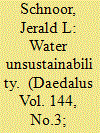|
|
|
Sort Order |
|
|
|
Items / Page
|
|
|
|
|
|
|
| Srl | Item |
| 1 |
ID:
093475


|
|
|
|
|
| Publication |
2010.
|
| Summary/Abstract |
Water deficits and their associated shortages are serious problems in many areas of the world. The paper presents a multi-criteria analysis for selection of the most suitable system in Mauritania. Six scenarios, different energy sources, technologies of water desalination processes and water use and five criteria are analyzed. The multi-criteria analysis shows that the optimal solution is different for each scenario; in some cases the photovoltaic-reverse osmosis option is preferable; in others, the best option is reverse-osmosis powered by wind energy or concentrating solar parabolic.
|
|
|
|
|
|
|
|
|
|
|
|
|
|
|
|
| 2 |
ID:
097194


|
|
|
|
|
| Publication |
2010.
|
| Summary/Abstract |
Climate change is one of the most important issues our world faces today and it is responsible for a number of natural disasters that threaten human life and existence. Carbon dioxide, produced from almost every energy consuming activity, is the dominant greenhouse gas responsible for global warming. Water desalination is an energy intensive activity, and when it is powered by conventional energy sources, significant amounts of CO2 are released. For every cubic metre of fresh water produced, there is a 2 kg of CO2 reduction if renewable energy sources (RES) are used instead of electricity from the local grid. On the other hand, the cost of fresh water produced by desalination is much less if conventional sources of energy are used.
Making appropriate policy choices require information on both costs and benefits. So here we estimate the critical CO2 cost, above which desalination units should use renewable energy instead of conventional energy sources. It was found that the critical CO2 emissions cost can be close to the CO2 capture cost and in many cases less than the penalties imposed by the European Commission. Several case studies of water desalination in the Aegean islands verify the conclusions.
|
|
|
|
|
|
|
|
|
|
|
|
|
|
|
|
| 3 |
ID:
097195


|
|
|
|
|
| Publication |
2010.
|
| Summary/Abstract |
Climate change is one of the most important issues our world faces today and it is responsible for a number of natural disasters that threaten human life and existence. Carbon dioxide, produced from almost every energy consuming activity, is the dominant greenhouse gas responsible for global warming. Water desalination is an energy intensive activity, and when it is powered by conventional energy sources, significant amounts of CO2 are released. For every cubic metre of fresh water produced, there is a 2 kg of CO2 reduction if renewable energy sources (RES) are used instead of electricity from the local grid. On the other hand, the cost of fresh water produced by desalination is much less if conventional sources of energy are used.
Making appropriate policy choices require information on both costs and benefits. So here we estimate the critical CO2 cost, above which desalination units should use renewable energy instead of conventional energy sources. It was found that the critical CO2 emissions cost can be close to the CO2 capture cost and in many cases less than the penalties imposed by the European Commission. Several case studies of water desalination in the Aegean islands verify the conclusions.
|
|
|
|
|
|
|
|
|
|
|
|
|
|
|
|
| 4 |
ID:
165288


|
|
|
|
|
| Summary/Abstract |
The article analyses the effect of Israel’s new maritime orientation on its foreign policy. It first demonstrates that in the last two decades Israel has changed its maritime posture in three important ways: it has developed energy dependence on offshore gas, begun extensive seawater desalination and dramatically expanded its navy’s platforms and missions. The paper then investigates the effects of these changes on Israel’s bilateral relations with its neighbours. Finally, the paper highlights the cumulative effect of these changes as well as some of their implications for Israel’s foreign policy.
|
|
|
|
|
|
|
|
|
|
|
|
|
|
|
|
| 5 |
ID:
189547


|
|
|
|
|
| Summary/Abstract |
Expanding on political ecology analyses that are increasingly applied to water-related challenges, this essay calls for greater attention to the political and social consequences of proposed water solutions. Concern about environmental health in Palestine often highlights a lack of water access, with proposed solutions focusing on increasing water supplies. Drawing on fieldwork in the West Bank, northern Israel, and Tel Aviv, this essay compares how differently situated residents and water managers evaluate the potential impacts of one type of supply-side infrastructure: desalination. This comparison counters avowedly apolitical technical evaluations of such initiatives by showing uneven sociopolitical costs and benefits.
|
|
|
|
|
|
|
|
|
|
|
|
|
|
|
|
| 6 |
ID:
139819


|
|
|
|
|
| Summary/Abstract |
Water is a vital renewable resource that is increasingly stressed by multiple and competing demands from people, industry, and agriculture. When water becomes unavailable or unusable, life itself cannot be sustained. Changes in supply and demand for water are driven by population growth, climate change, and our energy and land use choices. Poverty frequently precludes the ability of many people to respond and adapt to water insecurity. In this essay, we discuss the effects of these drivers on the diminution of rivers, aquifers, glaciers, and the severe pollution that renders some water resources unusable. While technologies for water reuse, desalination, aquifer replenishment, and better water pricing are important solutions, the recognition of water as a profoundly threatened resource and as a basic human right is essential for providing sustainable water for future generations.
|
|
|
|
|
|
|
|
|
|
|
|
|
|
|
|
|
|
|
|
|